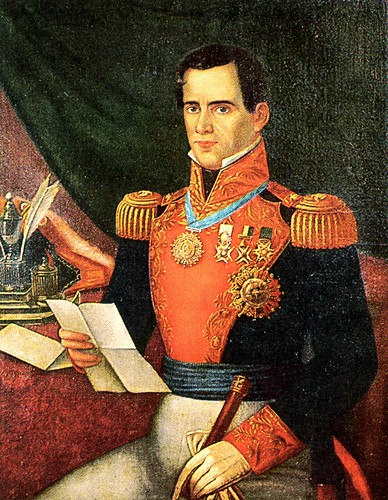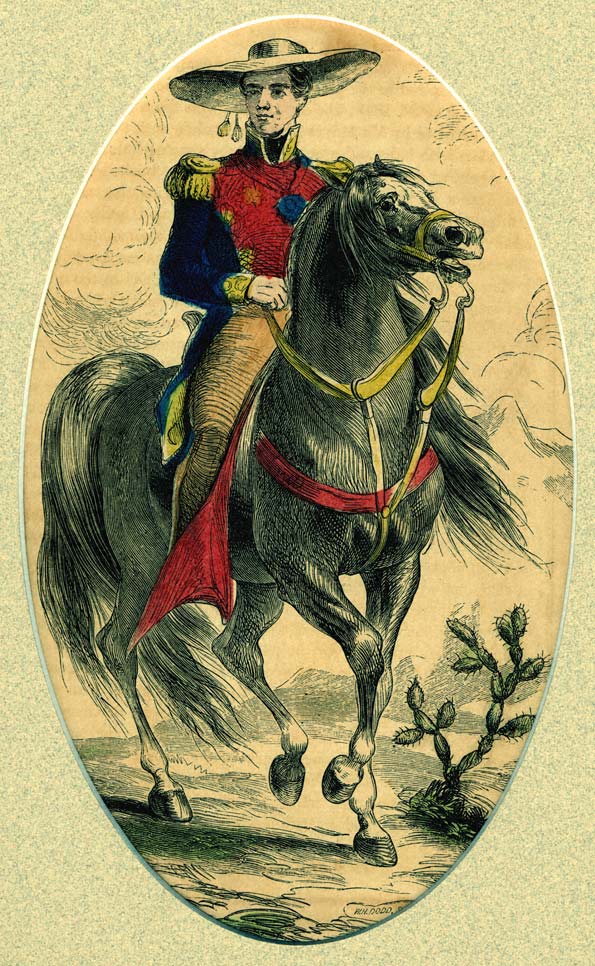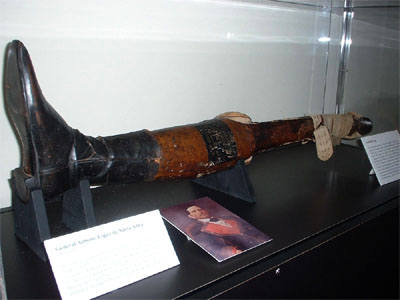

Santa Anna

Santa Anna's leg, now in a museum in Illinois
 |
 Santa Anna |
 Santa Anna's leg, now in a museum in Illinois |
Anonymous decimas dedicated to Santa Anna's leg
The ornate funeral ceremonies that General Santa Anna ordered performed in
1842 for his leg, which was lost fighting the French at the Battle of Veracruz
in 1838, are often seen as the culmination of that caudillo's vainglory and
megalomania. After being amputated, the leg spent four years buried at Santa
Anna's hacienda, Manga de Clavo, in Veracruz. When Santa Anna resumed the presidency
in late 1841, he had the limb dug up, placed in a crystal vase, and taken amidst
a full military dress parade to Mexico City (escorted by the presidential bodyguard,
the army, and cadets from the military academy), where it was buried beneath
an elaborate monument. The funeral involved cannon salvos,
speeches, and poems in the general's honor and was attended by the entire cabinet, the diplomatic
corps, and the Congress.
These two poems present differing viewpoints on the
leg.
Why should anyone criticize if a funeral is performed for the foot, arm,
or hair of an illustrious General?
Passions always tarnish merit with malevolence and really do not wish true
merit celebrated; So answer quickly and with confidence; Why should we not
honor merit in the lifeless limb of a great and heroic caudillo? Why
should anyone criticize?
To make this fitting obloquy to a sacrificed limb--not to the man, but to what he has given fearlessly for the Fatherland--it would be unjust, ungrateful, foolish and disloyal to claim it is not lawful or right that a lone foot have a tomb or mausoleum, that a funeral is performed.
Did Artemisia not hide the ashes of Mausolus in her breast [Mausolus was a Persian ruler in the 4th century BCE. He designed a huge, ornate tomb for himself that his wife had built after his death. That's where we get the word "mausoleum."] and believe this the only remedy? She did her duty. So today Mexico erects a tomb reaching to the sky, covering with ardent hope a jewel of History, and giving glory to the foot, arm, or hair.
There is a maxim which states a cherished principle: If one kisses the hem of a robe it is because of the Saint who wears it; thus, it is not for the foot itself, on the contrary, though traitors may complain that we say, for good or ill, "Viva!" and be assured that the people are grateful to an illustrious General.
**********************************
Nothing in life is permanent, God alone remains, so the things of this world are here today and gone tomorrow.
If we search through all of history we will not find a single soul whose triumphs and glory last for all eternity. Even so, our memory of great heroes is eternal; though no one can be constant in their conduct or their lives for until death arrives, nothing in life is permanent.
Such may be said of Santa Anna's foot which was placed in Santa Paula [the cemetery] with such solemn pomp and majesty; and today the Mexican populace, after rising in rebellion, full of enthusiasm and zeal, took the foot from the sepulchre; so it is clear that on the earth God alone remains.
At that hour and moment the foot's owner was far away; but around here his FOOT was walking around with the rebels. It is certain that no one felt any pain from this; but I believe that such an unthinkable act could only have been done by the things of this world.
At other times this foot was earnestly respected; but that was when its owner still held us in subjugation; today the people have treated it like a dirty old bone, because the nation no longer wishes to stand for it; because, in the end, good and evil are here today and gone tomorrow.
***********************************
In his autobiography, The Eagle, Santa Anna wrote that he was marching to put down the rebellion in 1844 when news of the mockery of his leg (a mob tied the severed appendage to a rope and dragged it through the streets of Mexico City while shouting, "Death to the cripple!") made him cry "Stop! I don't wish to hear any more! Almighty God! A member of my body, lost in the service of my country, dragged from the funeral urn, broken into bits to be made sport of in such a barbaric manner!" (See here, which presents excerpts from Santa Anna's autobiography [sample passage: "How well the people knew me! They knew I would never desert my principles and would always be on hand when my country needed me!"] if you don't believe me.) He then decided to leave the country in "that moment of grief and frenzy."